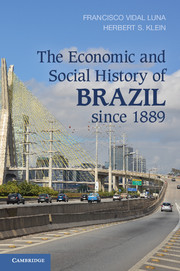2 - The Vargas Period, 1930–1945
Published online by Cambridge University Press: 05 June 2014
Summary
The issue that arose in the republican era and that would explain many of the developments in the post-1930 period was the social question. The slow emergence of an urban middle class and an industrial labor force created new social tensions that the old oligarchic government could not resolve with simple repression. It would take a political revolution and a completely new vision to begin to deal with the question of the incorporation of these new groups into national society in a coherent way.
Thus the Vargas revolution had as one of its core concerns the involvement of the state in dealing with the new social realities of an ever-more complex society. The Vargas period was one in which the state began to create a series of basic institutions to deal with labor relations, public health, pensions, and the economy, all designed to move the traditional oligarchic rural-based society into the modern era. This was done with a nondemocratic government that could forge new alliances with the growing industrial sector and harness the emerging urban middle class and the evolving labor movement into a permanent support of the regime in exchange for worker protections and the creation of a state-supported welfare regime. Its authoritarian nature allowed it to reduce the power of the old oligarchies and prevent them from successfully opposing these changes as it built up new alliances.
- Type
- Chapter
- Information
- The Economic and Social History of Brazil since 1889 , pp. 82 - 142Publisher: Cambridge University PressPrint publication year: 2014



